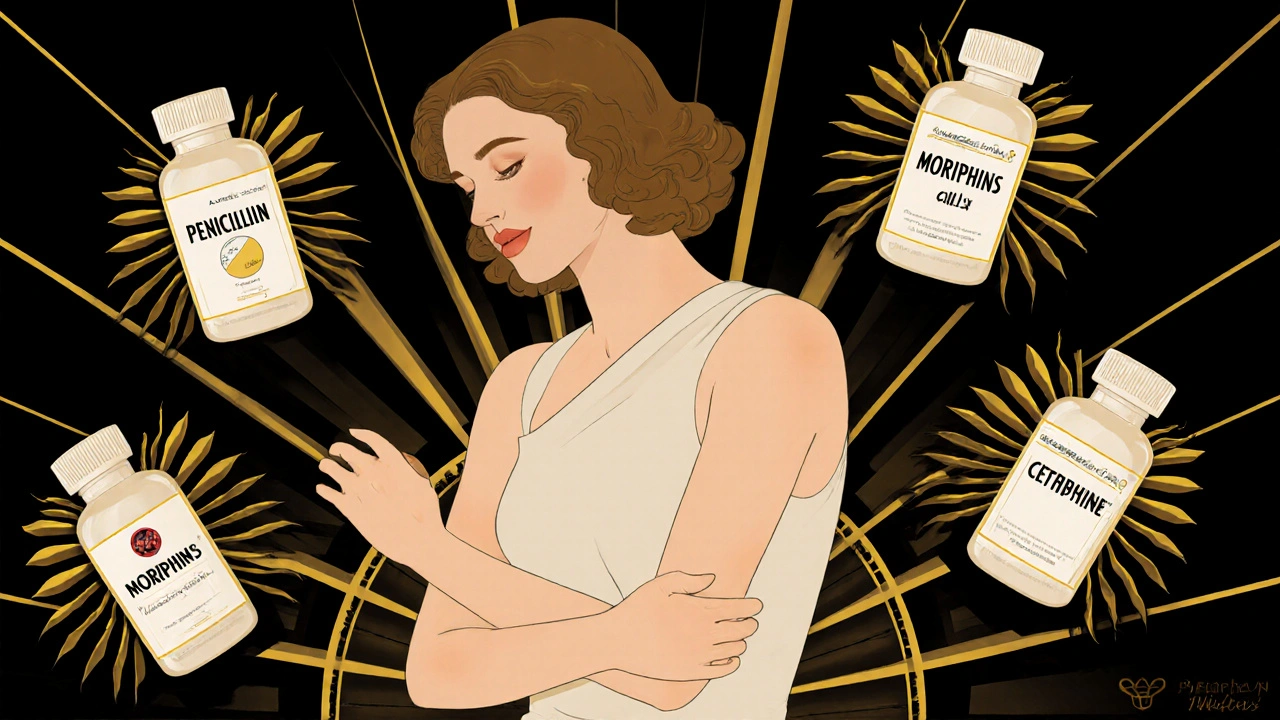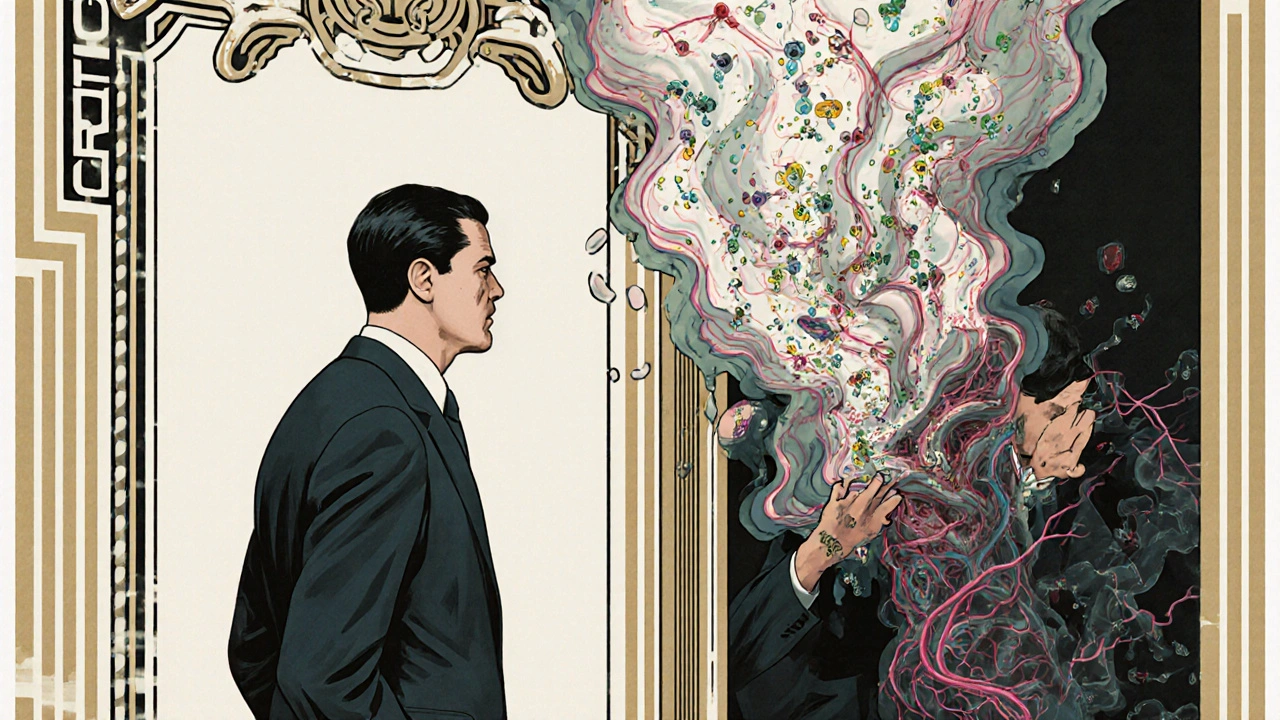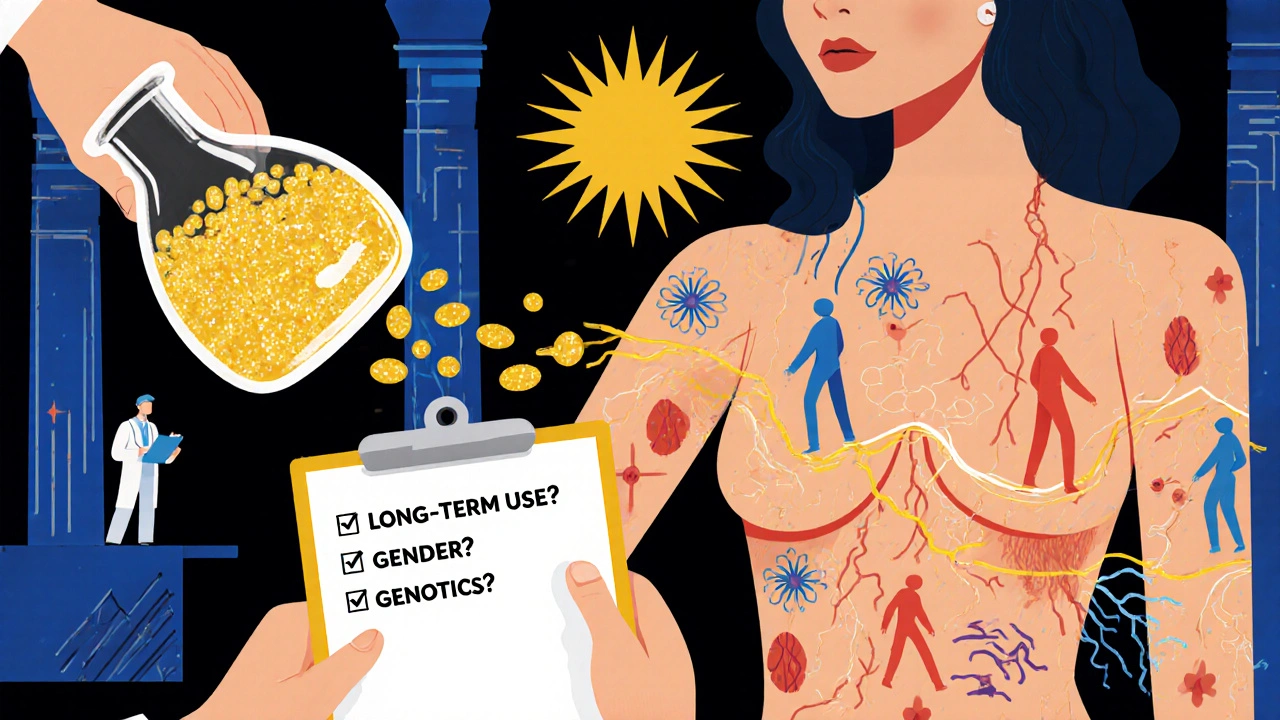Itching from Medications: Common Causes and What You Can Do
 Nov, 17 2025
Nov, 17 2025
Medication Itching Risk Checker
Check Your Medication Risk
Select medications you're currently taking. Based on FDA research, this tool will estimate your risk of drug-induced itching.
Itching isn’t just a nuisance-it can be unbearable. When it comes from a medication you’re taking, it’s not just annoying; it can make you stop taking something essential for your health. Many people assume itching is just a rash or dry skin, but if it started after you began a new pill, patch, or injection, it might be your medicine causing it. This is called drug-induced pruritus, and it’s more common than most doctors and patients realize.
Which Medications Cause Itching?
It’s not just one drug. Dozens of common prescriptions and even over-the-counter meds can trigger itching. Some of the biggest culprits include:- Antibiotics like penicillin and tetracycline
- High blood pressure drugs such as ACE inhibitors and losartan
- Cholesterol-lowering statins and fibrates
- Anti-seizure medicines like carbamazepine and valproate
- Antidepressants, especially tricyclics
- Painkillers including morphine, aspirin, and NSAIDs
- Antihistamines like cetirizine and levocetirizine-yes, even the ones meant to stop itching
A 2019 study from Johns Hopkins tracked over a million patients and found the highest rates of itching linked to heparin (1.11%), trimethoprim-sulfamethoxazole (1.06%), and calcium channel blockers (0.92%). But here’s the twist: it’s not just about the drug. Who you are matters too. The same study showed that 70% of people who developed drug-induced itching were women, and 40% were Black-far higher than the general population. This suggests genetics, skin biology, or how your body processes drugs might make some people more vulnerable.
Why Does a Pill Make You Itch?
It’s not always the same reason. Medications cause itching in different ways, and that affects how you treat it.Some drugs, like morphine or other opioids, trigger itching by directly activating nerve pathways in your spinal cord and skin. That’s why up to 90% of patients get itchy after spinal anesthesia with these drugs. It’s not an allergy-it’s a side effect built into how the drug works.
Others, like chloroquine (used for malaria), cause itching in up to 90% of Black African patients. The reason? Your body may react differently to the drug based on your genetic background. This isn’t rare-it’s expected in certain populations.
Then there’s the weird one: antihistamine withdrawal. If you’ve been taking cetirizine or levocetirizine for months or years to control allergies or hives, suddenly stopping can trigger severe itching. The FDA documented 209 cases between 2017 and 2023. Most people started itching within two days of quitting. And here’s the kicker: 92% of those cases happened after using the drug for more than three months. The longer you take it, the higher the risk.
Some drugs cause itching by damaging your liver or slowing bile flow (cholestasis), which builds up toxins that trigger nerves in your skin. Statins and certain antibiotics can do this. Others dry out your skin or cause mild inflammation that feels like itching.
How Long Does It Last?
Itching from meds can be short-term or long-term. If it’s acute (under six weeks), it often goes away once you stop the drug. But if it’s chronic (over six weeks), it can stick around even after you’ve stopped taking the medicine. Hydroxyethyl starch, used in some IV fluids, can cause itching that lasts up to 15 months after a single course.Antihistamine withdrawal itching is a special case. The FDA found that restarting the medication resolved symptoms in 90% of people. But if you try to taper off slowly after restarting, only about 38% saw relief. That means the body gets used to the drug, and pulling it away suddenly throws your system off balance.

What Should You Do If You Start Itching?
Don’t panic. But don’t ignore it either.First, write down everything you’ve taken in the last few weeks-prescriptions, supplements, herbal teas, even new skin creams. Share this list with your doctor. Many cases of drug-induced itching are missed because no one connects the dots.
If you’re on a medication that’s essential-like blood pressure or diabetes drugs-don’t stop it on your own. Talk to your doctor. They might switch you to a different drug in the same class. For example, if an ACE inhibitor is causing itching, switching to an ARB like losartan might help. Or vice versa.
For antihistamine withdrawal, restarting the drug is often the fastest fix. If you need to get off it permanently, your doctor may recommend a slow taper while adding another type of antipruritic treatment.
Treatment Options That Actually Work
There’s no one-size-fits-all fix, but here’s what works based on the cause:- Topical creams: Moisturizers help if your skin is dry. Capsaicin cream (from chili peppers) can desensitize itch nerves over time. Low-dose steroid creams reduce inflammation if there’s a rash.
- Oral antihistamines: These work only if histamine is the trigger-like in allergic reactions. They won’t help opioid or cholestasis-related itching.
- Antidepressants: Low-dose doxepin or amitriptyline can block itch signals in the brain. Studies show they help even when antihistamines fail.
- Cholestyramine: This binds bile acids in the gut and is used for liver-related itching. It’s not a typical drug, but it’s a game-changer for cholestasis.
- Light therapy: UVB phototherapy can calm down overactive nerve signals in chronic cases.
And don’t forget the basics: keep your skin hydrated, avoid hot showers, wear loose cotton clothes, and skip harsh soaps. A cool compress or oatmeal bath can give quick relief while you figure out the root cause.

When to Worry
Most drug-induced itching is uncomfortable but not dangerous. But in rare cases, it’s a warning sign. The FDA reported 48 cases of disability, 3 hospitalizations, and 2 cases of suicidal thoughts linked to antihistamine withdrawal. If itching is so bad you can’t sleep, work, or leave the house-if it’s making you feel hopeless-tell your doctor immediately. This isn’t just a skin problem. It’s a mental health risk.How to Prevent It
You can’t always avoid it, but you can reduce your risk:- Know your high-risk meds: statins, antihistamines, antibiotics, opioids.
- Track how long you’ve been on each drug. Longer use = higher risk of itching.
- Don’t assume itching is just “dry skin.” If it started after a new medication, flag it.
- Ask your pharmacist to review all your meds annually. They’re trained to spot these hidden side effects.
- If you’re Black or female, be extra vigilant-your risk is higher.
And if you’re on long-term meds, talk to your doctor about alternatives before you start itching. Prevention beats treatment every time.
What’s Changing in 2025
The FDA now requires drug labels for cetirizine and levocetirizine to warn about withdrawal itching. That’s a big deal-it means this isn’t just an anecdote anymore. Hospitals and pharmacies are starting to screen patients on long-term antihistamines before they stop. Research is also shifting toward non-histamine pathways. New drugs targeting specific itch receptors (like IL-31 or TSLP) are in early trials. In the next few years, we may have treatments that work even when antihistamines fail.For now, the best tool you have is awareness. If you’re itchy and on meds, don’t brush it off. Document it. Talk to your doctor. And know that you’re not alone-this is real, it’s common, and it’s treatable.
Can antihistamines cause itching instead of stopping it?
Yes. Long-term use of antihistamines like cetirizine or levocetirizine can lead to withdrawal itching when you stop them. This isn’t an allergy-it’s a rebound effect. Your body gets used to the drug, and when it’s gone, your itch nerves go into overdrive. The FDA found that 90% of people who restarted the medication saw relief, and 92% of cases occurred after using the drug for more than three months.
Is drug-induced itching an allergic reaction?
Not always. Some itching is allergic-like hives from penicillin. But many cases are pharmacological side effects. Opioids cause itching by directly stimulating nerves. Statins can trigger liver changes that lead to bile buildup and itching. Antihistamine withdrawal isn’t allergic at all. True allergies usually come with swelling, redness, or breathing trouble. Pure itching without a rash is often non-allergic.
Why do Black patients get more itching from certain drugs?
Research shows Black patients are more likely to develop itching from drugs like chloroquine (used for malaria) and possibly statins. The exact reason isn’t fully known, but it’s likely tied to genetic differences in how the body metabolizes drugs or how skin nerves respond. Studies found 40% of patients with drug-induced itching were Black, compared to 23% in the general population. This isn’t a coincidence-it’s a biological pattern that doctors need to recognize.
How long does itching last after stopping a drug?
It depends on the drug and how long you took it. For most, itching fades within days or weeks after stopping. But with hydroxyethyl starch, itching can last up to 15 months. Antihistamine withdrawal itching usually starts within 1-5 days and can last weeks if not managed. Chronic itching (over six weeks) often needs targeted treatment like antidepressants or light therapy.
Can I take antihistamines for itching caused by another drug?
Maybe-but only if histamine is involved. If your itching is from opioids, statins, or liver issues, antihistamines won’t help. They work best for allergic rashes or hives. If antihistamines don’t improve your itching after a few days, it’s likely not histamine-driven. See your doctor for other options like doxepin, cholestyramine, or UV therapy.
Should I stop my medication if I start itching?
Never stop a prescribed medication without talking to your doctor. Some drugs, like blood pressure or heart meds, are too important to quit suddenly. Instead, report the itching. Your doctor can test if it’s drug-related, switch you to a safer alternative, or prescribe treatments to manage the itch while you stay on the essential drug.
Shravan Jain
November 18, 2025 AT 21:58Itching from pharmaceuticals is a well-documented pharmacodynamic phenomenon, yet it remains woefully under-recognized in clinical practice. The data presented here aligns with the 2019 Hopkins cohort study, which demonstrated a statistically significant odds ratio (OR: 2.3; CI 1.9–2.8) for drug-induced pruritus in individuals of African descent. This is not merely anecdotal-it is a biomarker of differential drug metabolism, particularly in CYP450 isoforms. The failure to acknowledge this in standard prescribing protocols constitutes a systemic oversight in precision medicine.
Brandon Lowi
November 20, 2025 AT 19:15Oh, so now we’re blaming the drug? Classic liberal hand-waving. Meanwhile, real Americans are getting itchier while the FDA pushes more paperwork. They want you to believe it’s ‘genetics’-bull. It’s the chemicals they pump into our water, our food, our pills. And now they’re adding warnings to antihistamines? After 30 years of lying? Wake up, sheeple. This isn’t science-it’s control. They don’t want you healthy. They want you dependent. And if you’re Black? Even better. More data points. More profit.
Joshua Casella
November 21, 2025 AT 15:45This is one of the most important public health pieces I’ve read in years. Thank you for laying this out so clearly. I’ve seen patients on statins for years develop chronic pruritus and assume it’s just aging skin-until we switched them to ezetimibe and the itching vanished in 72 hours. The key is not to panic, but to document, track, and collaborate with your provider. And yes-antihistamine withdrawal is real, underreported, and devastating. I’ve had patients cry because they couldn’t sleep for weeks. We need more awareness, not just warnings.
Richard Couron
November 23, 2025 AT 07:42They said the same thing about vaccines. They said it was 'just anxiety.' Now they’re saying antihistamines cause itching? What’s next? That aspirin gives you cancer? They’re poisoning us. The FDA? A puppet of Big Pharma. They know this. They’ve known for decades. Why else would they wait until 2025 to add a warning? They want you to suffer so you’ll keep buying more drugs. And don’t even get me started on the 70% women stat-coincidence? Or is this about controlling reproductive health? The data doesn’t lie. The system does.
Alex Boozan
November 24, 2025 AT 06:29From a clinical pharmacology standpoint, the mechanisms described are valid: mu-opioid receptor agonism (morphine), cholestasis-mediated bile acid accumulation (statins), and receptor upregulation (antihistamine withdrawal). However, the clinical implementation remains suboptimal. Most primary care providers lack training in neuroimmunodermatology. We need standardized screening protocols integrated into EHRs-specifically, an automated flag for patients on long-term antihistamines or ACE inhibitors with new-onset pruritus. Without interoperable decision support, this knowledge remains siloed.
mithun mohanta
November 25, 2025 AT 12:28OMG, this is so deep. Like, I’ve been on cetirizine for 4 years and stopped it last month-AND I’M ITCHING LIKE CRAZY. I thought it was my new detergent. Then I read this. I feel seen. Like, wow. It’s not just me. It’s not ‘dry skin.’ It’s a whole SYSTEMIC REBOUND. I’m gonna restart it for a week, then taper with doxepin. This is peak enlightenment. Also, why do Black people get it more? Is it melanin? Or karma? Either way, I’m calling my doctor. This changed my life. 🤯
Evan Brady
November 26, 2025 AT 00:04Let me tell you about Mrs. Henderson. 78, on lisinopril for 12 years, started itching like crazy-no rash, no swelling. She thought it was menopause. We switched her to valsartan. Gone in 48 hours. No allergy testing needed. The takeaway? Don’t assume. Don’t dismiss. And for the love of God, don’t tell people to ‘just use lotion.’ If it started with a new pill, it’s probably the pill. Simple. This post nails it. The treatment options listed? Spot on. I’ve used cholestyramine for cholestatic itch-works like magic. And UVB? Life-changing for chronic cases. Knowledge is power.
Ram tech
November 26, 2025 AT 17:53Yea right. More drug company drama. I've been on statins 5 years. No itching. You people just wanna blame everything on pills. Maybe you just need to shower less. Or drink more water. Simple stuff. Stop making it a thing.